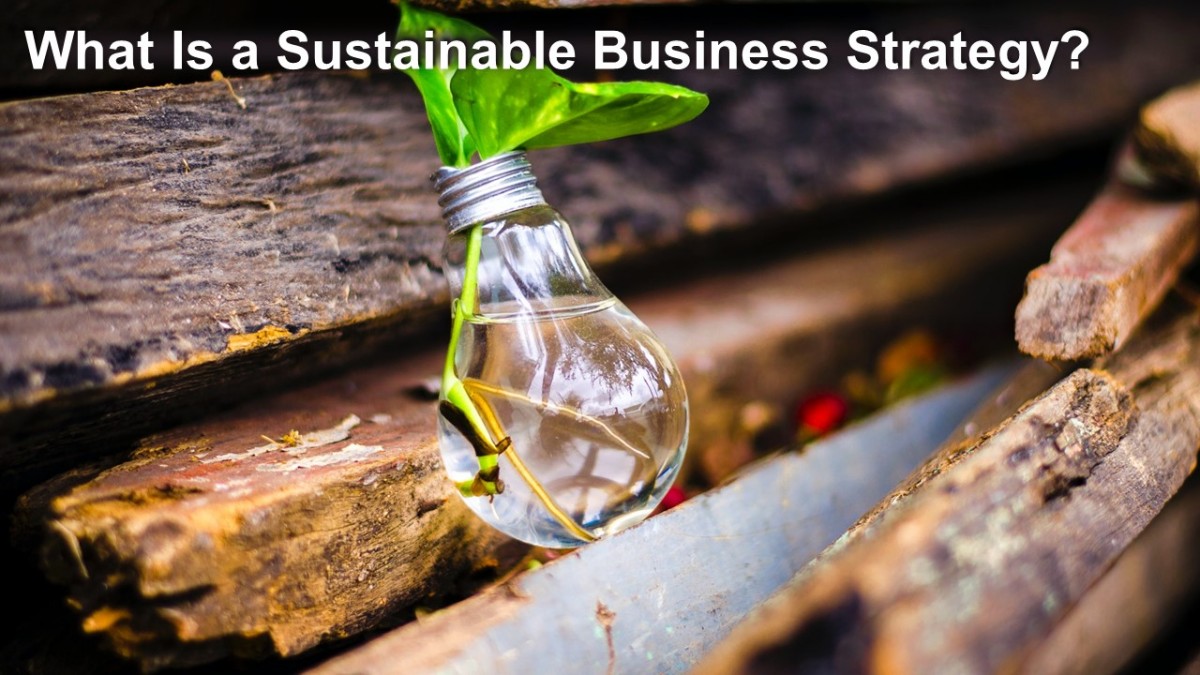Share:

Most leaders know a winning culture is key for the success of their organizations. They also know that business strategies should be interwoven with the mission and core values of the organization and work in conjunction with a strong culture to produce the desired outcomes.
Leaders are becoming increasingly aware that strategies yield long-term success when they consist of actions, policies, and procedures that are sustainable for the environment and for employees.
A sustainable business strategy is a business strategy that incorporates economic, environmental, and social factors into an organization’s policies, practices, and processes to create long-term benefits for the organization and its employees while being mindful of conserving and protecting resources.
As we continue to seek out practices we can undertake to mitigate future risks to the environment and our own negative impact on it, many companies are taking the idea of sustainability to the next level by considering how sustainable business strategies can positively impact not just the environment but employee engagement as well.
In this article, we will define and explore sustainable business strategies and examine why they are essential for the future success of organizations.


Sustainable Business Strategies Defined
Sustainable business strategies integrate economic activities and planning, creating long-term value for the organization, its stakeholders, and society as a whole.
A sustainable business strategy’s goal is to meet the needs of the organization, its clients, employees, and stakeholders today, while protecting resources and creating policies and practices that are sustainable well into the future.
A recent Harvard Business Review article discusses how important sustainability has become for companies and identifies a growing focus on “ESG” (environmental, social, and governance) issues. It points out that almost all the world’s largest companies now publish sustainability reports and set sustainability goals.
Additionally, over 2,000 companies have set evidence-based carbon targets, and around one-third of Europe’s biggest public companies have pledged to be carbon neutral by 2050.
In an effort to address issues of social justice, companies are boosting diversity and inclusion activities and policies, pledging financial assistance to help address racial inequity, and speaking out on societal issues they have traditionally avoided commenting on publicly.
These are just a few examples of what sustainable business strategies look like. There are many ways companies are exploring sustainable practices and the creative and innovative opportunities they hold for businesses that seek to implement them.
Sustainable Business Strategies Are Rooted in Sustainable Cultures
A sustainable business strategy should be rooted in a culture of sustainability that informs all the organization’s policies and practices.
A culture of sustainability, or sustainable business culture, is one in which all team members, from senior leaders to frontline people, are mindful of the effects the business has on its employees and the environment, not just the long-term financial success of the business.
A sustainable business culture prioritizes long-term impact and results over short-term gain, particularly in terms of the effect the business has on the well-being of employees, the community, and the planet, as well as financial results.
When paired with a culture of sustainability, sustainable business strategies guide organizations in establishing mindful policies and practices that reduce their negative impact on the environment and protect natural resources.
Sustainable business strategies designed and executed within the framework of a sustainable organizational culture help organizations link their prosperity to the well-being of the communities they serve.
Why Sustainable Business Strategies Matter
Leaders who want to build organizations that endure and achieve long-term success should consider the need to prioritize long-term impacts over short-term gains.
The effects a business’s actions can have on the well-being of its employees, the community, and the planet are immeasurable. In the bigger picture, the goal is to build an equitable, just, and sustainable economy, which will require a significant shift in how businesses operate.
As businesses are, to an extent, responsible for so many of the environmental and social woes currently affecting the world, including working conditions that exploit employees, the continued destruction of habitats, and depletion of natural resources, business strategies will need to expand beyond the “narrow pursuit of profits.”
Traditional profit-driven business models can be problematic in terms of their social impact and unsustainability because they often gut resources, harm the environment, and leave employees burned out and disengaged.
Sustainable business practices help to minimize these negative impacts, in the hopes of creating a better world and giving people purposeful, positive work.
When businesses focus on profit alone, they can ignore or justify how their practices affect the environment and the people who work for them. Businesses that utilize sustainable business strategies and focus more on environmental impact demonstrate more accountability and transparency.
Organizations that do this well have sustainability ingrained in every part of their culture, beginning with a mission or values statement with sustainability as its focus.
Benefits of Sustainable Business Strategies
Integrating sustainability practices into an organization’s strategy won’t just reduce the organization’s negative impact on the environment and society; it can also create opportunities to positively impact nature and society.
Global companies have a tremendous amount of influence. Their actions can affect consumption patterns and production practices, wielding a substantial amount of economic and political influence.
This influence can be used to squeeze maximum profits out of a resource at the expense of the planet and its inhabitants. Fortunately, it can also be used to help protect resources when those companies make a conscious decision to put people over profits.
There are many seemingly small practices that can be implemented within companies that can have a large impact on sustainability.
Going paperless when possible, recycling and reducing waste, and ensuring that the vendors your organization does business with are utilizing sustainable practices can boost sustainability within your company.
Businesses that cling to older, outdated, and potentially harmful practices driven by profit alone may fall behind those that offer the kind of clean, responsible practices that consumers and clients increasingly seek out.
Incorporating the needs of its people and places into the long-term success of the business and its prosperity can actually increase profits, as well as the business’s standing in the community, all of which increase the business’s chances for long-term viability.
A business that consistently makes decisions with sustainability as a filter, as reflective of its core values, is one that operates with integrity and takes action to put sustainability principles into practice.


Sustainable Strategies for Recruiting and Retention
Sustainable business strategies also create working environments that are sustainable for employees.
A business that prioritizes employee sustainability addresses the needs of its employees, whether within the office environment or their personal lives. When employee needs are met, employers will see increased engagement, productivity, and loyalty to the company.
In light of the Great Resignation, it has never been clearer that there is an inextricable link between sustainable policies and employee retention, engagement, and job satisfaction. Many people are increasingly finding themselves in work environments that are not sustainable for their well-being.
They are also finding themselves disappointed in the organizations they work for when they feel they aren’t making authentic, ethical efforts to take better care of the planet or invest in the long-term well-being of its inhabitants.
One of the biggest decisions a company can make regarding sustainability is to foster a caring culture within the organization. This is a best practice in terms of building a winning business culture with sound, people-focused strategies, and it creates a sustainable link between an organization’s prosperity and the wider community it serves.
When considering sustainability, leaders often think in terms of the monetary success needed to flourish financially. Forward-thinking leaders will recognize that when employees’ needs are met and they feel that their work has a greater purpose, engagement and performance improve significantly, as do profits.
Employee sustainability prioritizes the needs of employees. Leadership uses strategies that are compassionate, honest, and that build trust to create a positive work environment. Within such a positive environment, employees are encouraged to support and validate one another, as well.
The well-being of employees is also prioritized when companies adopt safety protocols or offer healthy options for food, activity, and mental health. Providing livable wages and access to healthcare are important ways businesses can sustain their employees.
This results in work environments that are more sustainable for employees. Workers feel valued, motivated to improve performance, and have greater loyalty to the company.
Business leaders who create an environment of shared goals and values within the company’s culture and mindfully craft sustainable strategies that achieve the organization’s mission and vision can see an increase in employee engagement, productivity, and retention.
This is just one of the reasons it’s essential for business leaders to consider how the longevity of their business is tied to the people and places it affects.
When senior leadership considers how they will implement sustainable business strategies in their organization, thinking long-term is the key. This can affect succession planning and ensure that missions that are focused on sustainability continue to guide decision-making in the future.
Putting people over profits can actually increase profits and help companies weather future changes with more agility. It can also boost the company’s reputation, which is good for the bottom line.
Sustainable Business Strategies in Action
Businesses can have profound impacts on the environment. Regardless of what they create or consume, the by-products of business operations can wind up in our air, water, landfills, or our bodies.
Harm reduction is one way businesses have sought to minimize negative impacts on the environment. Adopting new technologies which use clean energy, waste reduction, or more efficient production methods is even better, and more companies are seeing the benefits.
If the business creates harmful byproducts or uses up valuable resources, it can adopt harm-reduction strategies, utilize technology that is more environmentally friendly, and implement other policies and practices that are created within the framework of sustainability.
While changing methods and adopting new technologies can require up-front investments, the long-term benefits to the environment help the business sustain itself without using up resources it needs or wasting money on unnecessary or outdated methods.
Employees who work for organizations that implement sustainable business strategies can take pride in working for a company that prioritizes environmental health and holds itself accountable for the impact it has.
A business that works toward accountability and improving its environmental impact will also improve its standing in the community and in society. A positive “do good” reputation will attract better talent, draw more clients, and increase the company’s financial success.
Looking Toward the Future
For leaders who want to build organizations that endure, and ensure that the communities they serve endure, implementing sustainability practices now is vital for future success.
In a world of increasing visibility and accountability, crafting a truly sustainable business strategy that incorporates the needs of employees and the environment into an action plan for a company’s prosperity is not only the way of the future, it is the best path to it.
Many workers, particularly frontline workers, are facing overwork, burnout, and a high level of overall dissatisfaction with their jobs. They are also finding it more difficult to connect with their co-workers in remote and hybrid work environments.
These factors have made workplace culture an even more vital asset for leaders who want to take real actions to address this issue and create more sustainable work environments for employees.
To address this issue, employee sustainability should be at the forefront of recruitment and retention strategies. Nurturing a culture of care in which employees are supported and can thrive is one of the most important sustainable business strategies an organization can implement.
Having a team of qualified, engaged employees who perform well is essential for the future success of all businesses.
Pursuing strategies that foster trust with employees and demonstrate care for their well-being will not only cut down on turnover and boost engagement and performance, it will also make them better at serving clients.
Because strong leadership is essential in the push for global sustainability, a sound succession plan should also be a part of your organization’s sustainability strategy.
This important aspect of sustainability is often overlooked and underestimated, but it is vitally important to the future success of the organization and the positive impact it can have in the world.
You can spend years in a leadership role, implementing successful sustainability strategies, but what happens if there is no one to take over that role one day? Who will continue the strategies that have guided the business to success?
A succession plan that cultivates future leaders who will continue the company’s culture of sustainability should be part of your company’s sustainable business strategy.
Having the right people in place to step into leadership positions will keep your sustainability strategies on track. Investing in your employees’ professional development and providing mentoring opportunities will ensure your organization has a strong leadership pipeline.

Matt Tenney has been working to help organizations develop leaders who improve employee engagement and performance since 2012. He is the author of three leadership books, including the groundbreaking, highly acclaimed book Inspire Greatness: How to Motivate Employees with a Simple, Repeatable, Scalable Process.
Matt’s ideas have been featured in major media outlets and his clients include numerous national associations and Fortune 500 companies.
He is often invited to deliver keynote speeches at conferences and leadership meetings, and is known for delivering valuable, actionable insights in a way that is memorable and deeply inspiring.


